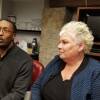For his first public event after being named director of the Boston Office of Returning Citizens, David Mayo convened a group of formerly incarcerated people, their counselors and service providers Thursday evening to ask for their help in creating “the greatest returning citizens office in the nation.”
The roundtable in Nubian Square was part therapy session and part strategy session. Many among the crowd of about 60 people told tearful stories of addiction, stigma, injustice and recovery. Mayo promised to serve them from his heart.
“This is my life and my legacy,” he said. “This is not coming to a job.”
Mayo said his goal was to ask the participants to help him focus the office he now runs on the issues that are most critical for people returning from years or decades of incarceration.
The group, led by several people recently out of prison after serving many years, quickly focused on one theme: trust.
Several of the returning citizens — GBH News is not publishing their names in order to protect their privacy — talked about how critical it is to have a trusted person they could talk to, and who they knew would truly listen.
They also spoke of the critical importance of education and employment opportunities, and how someone may be impatient being told to wait in line for job training after being behind bars, where they had to wait in lines for showers, meals and phone calls.
When a returning citizen comes to a service provider, the most important thing, they said, is that any promises made are actually kept.
Mayo made essentially the same demand. Noting that his office now has a $2.6 million budget — more than four times its budget last year — he said, “I have a resource of funds that I have to spend down in the next 9 months.” But he cautioned any who might want to apply for some of that money that “if you say you are going to do something, I need a return on investment.”
Mayo, who was appointed to his post by Mayor Michelle Wu last month after serving in a similar role in the Suffolk County Sheriff's office since 2019, said he already has plans for a citywide celebration of returning citizens in March. He also promised to hold listening sessions with groups of formerly incarcerated people, suggested that he would prioritize creating a mentoring program based on their comments from the roundtable, and said he would be open to hiring returning citizens to work on his staff.
His boss, Chief of Human Services José Massó, also promised that the returning citizens office will soon move out of its space in the Seaport’s industrial “drydock” area, presumably to a location closer to the residents it serves.
In a gesture of service to these residents, Human Service staff members — including Massó — lined up behind the buffet table and ladled barbeque chicken, macaroni and cheese and vegetables onto the guests’ plates before the roundtable convened.








